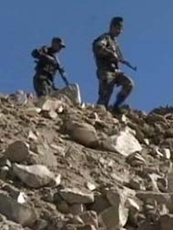India stands firm on Doklam plateau, accuses China of incursion
01 Jul 2017
India has asked China to desist from changing the ground position in the Doklam plateau, where Beijing is seeking to build a road.
 For the first time on Friday, New Delhi admitted that its troops had blocked People's Liberation Army road works inside Bhutan territory claimed by China.
For the first time on Friday, New Delhi admitted that its troops had blocked People's Liberation Army road works inside Bhutan territory claimed by China.
In a statement, the Indian government said, "India is deeply concerned at the recent Chinese actions and has conveyed to the Chinese Government that such construction would represent a significant change of status quo with serious security implications for India."
Meanwhile, PLA troops continue to deploy construction equipment in an effort to drive a dirt track through the strategic Doklam plateau despite a three-week stand-off with the Indian Army and the Royal Bhutan Army, senior Indian government reportedly officials said on Friday.
The PLA's road works, the officials said, are aimed at bringing a road close to Doka La, India's last military post on the junction of its boundary with Bhutan and China.
Both sides have reinforced their positions amidst a continuing war of words between Beijing and New Delhi. But Indian military officials rejected claims that there were signs of imminent conflict in the region - the site of intense skirmishes in 1967, provoked by similar disputes over border works.
India and Bhutan, the government statement said, have been in ''continuous contact'' over the Doklam developments. ''In coordination with the Bhutanese government, Indian personnel, who were present at general area Doka La, approached the Chinese construction party and urged them to desist from changing the status quo… these efforts continue,'' the statement said.
So far the situation remains "tense but civil" among the troops on both sides. But there seems a determination at the top levels of the Indian government not to let China alter the determination of the tri-junction.
The Kailash Mansarovar Yatra from Nathu La has been stopped by China. However, border trade continues and the Lipulekh route to Kailash remains open.
National security adviser Ajit Doval cut short his visit to the UK where he was conducting a strategic dialogue, while foreign secretary S Jaishankar is leading the diplomatic exchange with China and Bhutan. Officials in Beijing and New Delhi are in "constant contact" to defuse the situation.
Indian Army chief Gen Bipin Rawat has also landed in the border state of Sikkim, closest to the standoff site. (See: Army chief Rawat visits Sikkim amid Chinese tensions).
Prime Minister Narendra Modi will meet Chinese president Xi Jinping in a BRICS group interaction on the sidelines of the G-20 in Hamburg next week.
The Indian side is reportedly irate at China's modus operandi - Chinese troops regularly creep forward, changing the status quo, and later use it to alter the terms of negotiation, often taking recourse to "ancient times" to justify their actions.
India has asked "all parties concerned display utmost restraint and abide by their respective bilateral understandings not to change the status quo unilaterally".
In 2012, the special representatives of India and China had worked out a written understanding that "tri-junction boundary points between India, China and third countries will be finalised in consultation with the concerned countries. Any attempt, therefore, to unilaterally determine tri-junction points is in violation of this understanding," India has said.
On 16 June, a PLA construction party came in with earth movers and other heavy equipment to build a road in the Doklam area. A Bhutanese post nearby came to object, but the numerically superior Chinese drove them away. Indian soldiers then came to support the Bhutanese effort, and successfully stopped the road building activity.
Indian troops don't plan to leave, because any sign that India condones the Chinese construction activity would endanger India's own security on the Siliguri Corridor, popularly known as the "Chicken's neck", and could cut off India's northeast.
On 20 June, Bhutan lodged a formal complaint with the Chinese embassy in New Delhi, saying this incursion was "direct violation of the 1988 and 1998 agreements between Bhutan and China and affects the process of demarcating the boundary between these two countries''. They have urged a ''return to the status quo as before 16 June 2017".



















